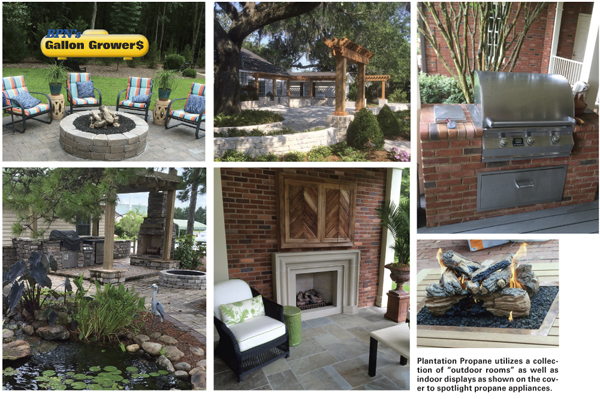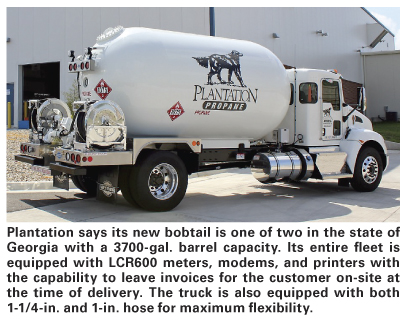
“I find it hard to believe that we would be as good a service provider for our customers if we did not offer the appliances and the service for them,” said Setliff, who oversees sales and marketing for the company and has been with the business since 1992. Monty Lewis owns Plantation Propane & Petroleum, which started out as Chastain-Clark Oil Co. and has been around for about 60 years. The company serves about 5000 propane customers and about 1000 petroleum customers from six locations in southwest Georgia and north-central Florida. The company also markets Chevron lubricants. “I don’t think we would do as well as just an LP-gas seller or provider. We have to be total service. Just because it’s mechanical, you’re going to have malfunctions and service needed.” A customer doesn’t want to call one company for installation, another for service, and another to deliver the propane. “He needs to be able to call one number and get whatever he needs taken care of.”
The company’s extensive appliance line includes water heaters, indoor and outdoor heaters, gas logs, outdoor fireplaces, grills, cookers, generators, and gas lights. “We push tankless water heaters hard,” Setliff said. He believes propane companies that are experiencing a decline in residential gallons must work to replace burners that customers have pulled out.
“You’ve got to find some niches,” he noted. “You’ve got to find something that not everyone else is doing, and do it in a different way than everyone else is doing. The best way to do that is to be more knowledgeable about the product than the guy down the road, whether that’s another dealer or the big-box store.”
How do he and the employees get that knowledge? “You’ve got to study,” he explained. He and his employees read product brochures and have a good relationship with the manufacturers’ distributors and route salespeople. Their relationship with manufacturers means being able to reach them, sometimes at off-hours, to answer any questions that arise.
Most Plantation employees have completed Rinnai’s Level 3 training for tankless water heaters and know how to troubleshoot most error codes. Instructors for the training will break down an actual water heater, and the classroom participants will put it back together so it displays the proper code 11. If the student puts the heater back together incorrectly, it will show an error code.
Plantation Propane has hosted Level 3 training at its offices in the past, inviting some of its propane company competitors, local plumbers, and heating, ventilation, and air conditioning technicians to participate.
“We all take off our company shirt for the day, and for that day we are all guys who are trying to make sure that for the area that we cover, the customer base has qualified techs to be able to pull off any type service or repair they would need,” he said.
When he first started with Plantation Propane, Setliff worked on the petroleum side, building gas stations and performing federally mandated upgrades to gas stations. He eventually became a propane service tech and went on to manage one of the branches. Sales and marketing are his current focus. He spends much of his time helping customers who walk in to the office or call in needing assistance.
For the appliance business, most of the products run on propane, but the company will order them in natural gas upon customer request. Most important, Setliff notes that his company will not just sell a product and then turn its back on the customer. Plantation will assist the customer’s contractor if he doesn’t know how to install the product. The business does that to avoid what Setliff calls “bad advertising.”
“You can have 10 good jobs, but that one bad job will hold you back for the next several potential customers.”
Rinnai tankless water heaters that run on propane are probably the top-selling appliance at the company. Gas logs do well during cold weather, but extreme cold is rare in that area of Georgia. Like it does with its other products, the company will order natural gas logs upon customer request. Empire, Monessen, and R.H. Peterson are top fireplace sellers.
If propane marketers are not already in the appliance business, Setliff recommends that they start. When preparing to enter the appliance business, marketers should develop relationships with building contractors and make them aware of propane. Setliff and his company pay attention to activity at city permitting offices and try to touch base with homeowners and builders before the decision has been made on which source of energy to use.
Company representatives will contact the homeowners and builders, expressing interest in doing business with them, ask if they have thought about using gas, and leave them a business card, all in a low-pressure manner. If Setliff or his team notice a specific architect is building several homes in a certain area, they will try to build a relationship with the architect. “If you’ve got a good enough relationship with your contractor, you can see who did the prints. Whenever I’m reviewing a set of drawings, I’m keeping up with who the architects are. As I see those names come up more and more, I see I need to be finding out more about them and see if I can get a relationship going there. There’s lots of legwork in this, but it works.”
His top tips to run a successful appliance business? Be flexible. Have a quality product offering, because if the product breaks down, the customer might express his dissatisfaction in public, which again, is bad advertising. He mentions Rinnai tankless water heaters as some of the most reliable products he has seen in his many years in the construction industry.
Plantation tries to follow the Energy Pod model from the Propane Education & Research Council, a system for home construction “that treats five areas of energy use in a home—space heating, water heating, cooking, clothes drying, and fireplaces—as part of a whole-home energy package.” Because of the area’s milder climate, the company doesn’t see as much central heating business as it used to, but secondary heat such as gas log sets, outdoor kitchens, and fire pits gets more attention.
What trends is he seeing in the area of propane appliances? People want high quality. They want “sleeker installations,” with mechanical parts less visible and blending in as much as possible. Setliff sees that as a positive trend. It makes the job look better. On fireplaces, Plantation Propane uses black-out paint on the mechanical components so they aren’t as visible when the fireplace is on.
He is seeing an increased interest in outdoor kitchens. They were in decline in the Atlanta and Macon areas during the construction slump, but they are making a comeback. Some people who were thinking of selling their homes are staying in them, but making them more comfortable with the amenities they want.
Serving the customer well will always be a strong trend. “We use the unspoken term, ‘total flexibility.’ When the customers come in and tell us what they want, that’s what we try to provide for them. If someone makes an odd request, rather than turn it down, Plantation will write a fairly priced estimate and job description and let the customer decide what to do.”
Setliff concluded that if propane companies are going to be around for the long haul, they must remember what got them and the industry on the map in the first place: “Offering a total source solution for your customers’ needs.”
“Getting back to the basics is key. Selling, installing, and servicing gas-fired products and offering reliable delivery services must be your long-range focus to remain viable in today’s competitive market.” —Daryl Lubinsky

